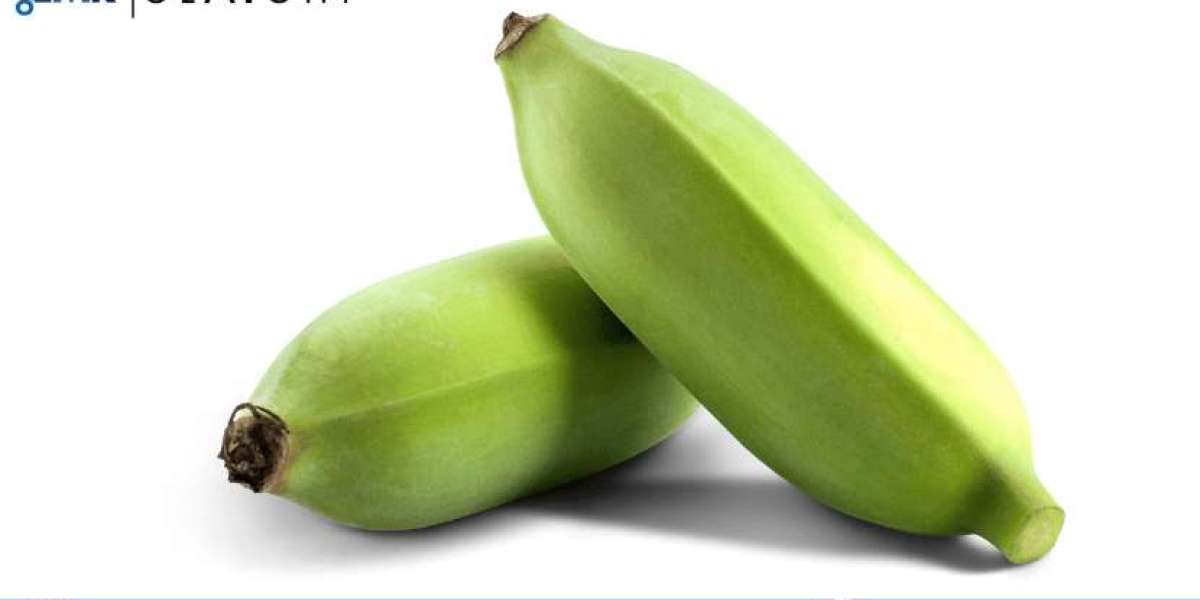The organic banana market is characterized by growing consumer demand for products that are produced without synthetic pesticides or fertilizers. This market segment benefits from heightened awareness around health, environmental sustainability, and ethical production practices. Organic bananas command a premium price over conventional bananas, reflecting higher production and certification costs. Key players include both small-scale farmers and large multinational corporations. The market is also influenced by challenges such as disease management and the need for stringent certification processes. Despite these hurdles, the organic banana market is expanding globally, driven by consumer preferences for healthier and more sustainable food options.
Organic Banana Market Size and Growth
The global organic banana market is on a robust growth trajectory, projected to expand at a compound annual growth rate (CAGR) of over 10.5% from 2024 to 2032. This impressive growth is largely fueled by a rising consciousness among consumers about health, wellness, and food safety concerns. As people become more informed about the benefits of organic produce, which is cultivated without harmful pesticides or synthetic fertilizers, the demand for organic bananas has surged. This trend is reflective of a broader shift towards organic and sustainable food choices, propelled by concerns over environmental impact and personal health.
North America stands as the largest market for organic bananas, a testament to the region's heightened awareness and willingness to invest in healthier food options. This leadership position is supported by a well-established organic food infrastructure, from farm to retail, and a consumer base that is increasingly prioritizing organic and environmentally friendly products. The combination of these factors not only underscores the significant market size and growth potential in North America but also highlights the global momentum towards organic food consumption, with organic bananas being a key focus area.
Organic Banana Market Trends
The organic banana market is shaped by several key trends reflecting consumer preferences, technological advancements, and sustainability initiatives:
Request Sample: https://www.expertmarketresearch.com/reports/organic-banana-market-report/requestsample
1. Rising Health Consciousness: Consumers increasingly seek foods that are not only nutritious but also grown in ways that minimize health risks associated with pesticides and other chemicals. This health-driven demand is a significant driver for the organic banana market.
2. Sustainability and Ethical Practices: There's a growing trend towards more sustainable and ethically responsible farming practices. Consumers are more aware and concerned about how their food is produced, leading to greater demand for products like organic bananas that are perceived as more environmentally friendly and socially responsible.
3. Supply Chain Transparency: With the advent of blockchain and other traceability technologies, consumers can now trace the journey of their organic bananas from farm to table. This transparency is becoming increasingly important to shoppers who value authenticity and ethical production methods.
4. Premiumization: As consumers are willing to pay more for products that align with their values and health preferences, organic bananas often command a premium price over their conventional counterparts. This trend towards premiumization supports the growth of the organic segment within the broader banana market.
5. Innovative Packaging and Distribution: To differentiate and add value, organic banana brands are investing in innovative packaging solutions that are eco-friendly and enhance product shelf-life. Additionally, efficient distribution networks are being developed to ensure the freshness of organic bananas upon reaching consumers.
Market Opportunities and Challenges
The organic banana market presents a mix of opportunities and challenges that shape its dynamics and future growth potential.
Opportunities:
1. Growing Consumer Demand: The increasing awareness and concern among consumers about health, environmental sustainability, and ethical production practices create a strong demand for organic bananas. This trend provides significant opportunities for producers and retailers to expand their market share and explore new markets.
2. Premium Pricing: Organic bananas can command higher prices than their conventional counterparts due to the perceived health and environmental benefits, as well as the higher cost of organic farming practices. This premium pricing offers an opportunity for increased profit margins for farmers and businesses involved in the organic banana supply chain.
3. Expansion into New Markets: As global awareness and demand for organic products continue to rise, there are opportunities for the organic banana industry to enter and expand in emerging markets, especially in countries with growing middle-class populations interested in healthier food options.
4. Innovation and Value Addition: There is room for innovation in areas such as packaging, branding, and the development of value-added products (e.g., organic banana chips, flour, etc.). These innovations can help companies differentiate themselves and capture more value within the organic banana market.
Challenges:
1. Supply Chain Complexity: Organic bananas require specific growing conditions and handling to maintain their organic status, leading to complexities in the supply chain. Ensuring the integrity of organic bananas from farm to table, while maintaining freshness and quality, can be challenging and costly.
2. Certification and Regulation: Obtaining and maintaining organic certification is a rigorous and expensive process for farmers. Moreover, the organic market is subject to a variety of regulations that can vary significantly from one country to another, complicating international trade.
3. Competition and Market Saturation: As more producers enter the organic market to capitalize on its growth, competition intensifies. This can lead to market saturation, where the supply of organic bananas exceeds demand, potentially driving down prices and profit margins.
4. Vulnerability to Diseases and Pests: Organic banana crops are more susceptible to diseases and pests since they are grown without synthetic pesticides. This vulnerability can lead to significant losses and challenges in maintaining consistent supply levels.
5. Climate Change: Organic banana cultivation is highly sensitive to changes in climate conditions. Extreme weather events, such as hurricanes, droughts, and floods, can devastate crops, disrupt supply chains, and lead to volatility in prices.
Market Dynamics
The organic banana market dynamics are influenced by a variety of factors that affect its supply, demand, and overall growth. Here are some key points that illustrate these dynamics:
1. Increasing Consumer Awareness: Growing awareness about health benefits associated with organic foods and concerns over the environmental impact of conventional farming practices drive consumer demand for organic bananas.
2. Premium Pricing Strategy: Organic bananas typically command a higher price than non-organic ones, reflecting the higher costs of organic farming, certification, and sometimes limited supply relative to demand.
3. Certification and Standards Compliance: Organic certification requires adherence to strict agricultural practices, including the prohibition of synthetic pesticides and fertilizers, which can pose both a barrier and a quality assurance factor for producers.
4. Supply Chain Management: Efficient supply chain management is crucial to maintain the integrity and freshness of organic bananas from farm to market, considering their perishable nature and the need for specialized handling and transportation.
5. Global Trade Patterns: The global nature of the organic banana market involves complex trade dynamics, including import-export regulations, tariffs, and bilateral agreements, which can impact market accessibility and cost structures.
6. Sustainability and Ethical Production: There is a strong emphasis on sustainability and fair labor practices within the organic banana industry. Producers and distributors who invest in sustainable farming practices and ethical labor standards may gain a competitive advantage.
7. Technological Advancements: Technology plays a role in improving organic banana production and distribution, from innovative organic pest management techniques to blockchain for enhancing supply chain transparency and traceability.
8. Market Saturation and Competition: As the market for organic bananas grows, increased competition and potential market saturation pose challenges in terms of maintaining price stability and market share for producers.
9. Impact of Climate Change: Organic banana cultivation is vulnerable to the effects of climate change, with extreme weather events and changing climate patterns posing risks to production stability and supply consistency.
Competitive Landscape
The key players in the global organic banana industry includes:
- Chiquita Brands International Sàrl
- Coliman Group
- Del Monte Fresh Produce Co.
- Dole Food Co. Inc.
- Fyffes Ltd.
- Agroamerica Fruit Company
- Arco International Co., Ltd.
- Agro Fair Benelux B.V
- Grupo Iren
- The African Food Company, Lda
- Others
Media Contact
Company Name: Claight Corporation
Contact Person: John Walker, Corporate Sales Specialist – U.S.A.
Email: [email protected]
Toll Free Number: +1-415-325-5166 | +44-702-402-5790
Address: 30 North Gould Street, Sheridan, WY 82801, USA
Website: https://www.expertmarketresearch.com



